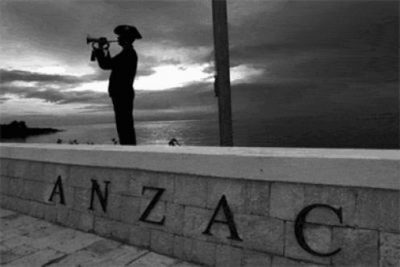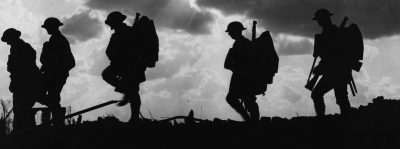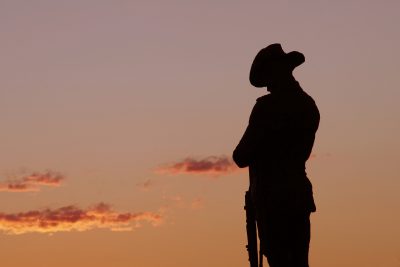By
Rupen Savoulian
April 25, 2015 marked exactly one hundred years of the Australian and New Zealand Army Corp (Anzac) offensive against the forces of the Ottoman Turkish empire at Gallipoli. There were many moving, and emotional commemorative activities on the day, as Australians like myself remembered those who fell in what was an ultimately disastrous campaign.
Anglo-French military leaders had figured on opening a new front, intending on capturing the Dardanelles, defeating the German-allied Ottoman empire, and assisting the Imperial Russian ally in the East.
The amphibious assault, involving thousands of British and French troops, also witnessed the participation of soldiers from the former colonial possessions of the British and French empires. Thousands of Indian troops, a Sikh brigade, fought alongside the Anzac soldiers for the duration of the Gallipoli campaign. Let us not forget the 10,000 French soldiers who died fighting the Ottoman Turkish army, even though the French (along with the British) had colonial ambitions for the territories controlled by the Ottomans. The campaign by the Western Allies was not humanitarian in nature – political and economic calculations motivated the desire to defeat the Ottoman Turkish forces, and subsequently partition the Middle East into easily controllable portions (the Sykes-Picot Agreement was negotiated in secret).
The invading forces were multinational in composition, however, in Australia it is the Anzacs that understandably receive the most attention. Obviously we must remember our own compatriots that have lost their lives in battle. Hopefully, this compassion will be extended to the thousands of indigenous Australians who served in the Australian military. Even though the First Nations of Australia were not even considered citizens at the time, indigenous people signed up to the military and served with distinction in World War One. They participated in various campaigns of that war, including Gallipoli.
The Ottoman Turkish forces were also multiethnic, consisting of Arabs, Assyrians, Greeks and other minorities. The soldiers confronted by the Anzacs at Gallipoli were not only Turkish, but Arabs, conscripted from the various Arabic-speaking territories under the control of the Turkish Sultan.
Every year in Australia, there is a national discussion about how the Gallipoli campaign forged our national identity, graduated us to the world of independent nations and provided a foundational sense of national assertiveness. All that may contain an element of truth, but it is a very distorted picture that obscures a number of important lessons about Australia’s role in the international system.
After all, Gallipoli was not the first time that Australians served as auxiliary troops for the British empire. Back in 1885, volunteers from New South Wales (at the time still technically a colony of the English) served in the British-led campaign to violently suppress an anti-British, indigenous and Islamist-inspired uprising in the Sudan. Australians fought alongside the imperialist states in 1900-01 in China to help defeat an indigenous and nationalist uprising against foreign domination by the Chinese Boxer rebellion.
Serving an imperial master
The importance of Anzac Day lies not in remembering the fallen, buttressing our notions of mateship, sacrifice and courage – as important as those are. Anzac Day has become another stepping stone in Australia’s role as an unthinking, subservient junior partner to imperialist empire-building. Professor Tim Anderson, an academic and solidarity activist at the University of Sydney, wrote an article “The ANZAC Myth, a cult of imperial dependence”. He states that:
It is no accident that, one hundred years after the disastrous Gallipoli operation, Australian troops are again being sent to the Middle East. While in 1915 the ‘First Australian Imperial Force’ was used by the British Empire to attack the Ottoman Empire, in 2015 the ‘Australian Defence Forces’ are being used as part of an extended North American operation to control the entire Middle East.
These decisions to follow the British empire are not just a relic of a long-gone age of our history. 2015 marks the fiftieth anniversary of the momentous decision by then Australian Prime Minister Robert Menzies to voluntarily commit Australian troops to America’s war on Vietnam. This decision firmly tied Australia to the mast of US imperialist empire-building. No longer were we just an ally; now we were a junior mercenary advancing the war aims of the rising power in the North. Nicholas Ferns, PhD candidate in history at Monash University stated in his article on this subject that Menzies’ commitment is the forgotten skeleton in the closet:
This forgetfulness suggests a great deal not only about the current national “besottedness” with Gallipoli, but also concerning our collective unwillingness to confront less honourable aspects of our diplomatic and military history. With some notable exceptions, the nation’s populist commentators and the war pathos industry have used Gallipoli as a vehicle for national self-aggrandisement, despite the efforts of some academic historians to push for a more considered approach.
The sordid aspects of our military history
The present author’s late father was born and raised in Egypt. He knew the about the Anzacs very well, years before he migrated to Australia. He learned about the Anzacs not in the context of the Gallipoli commemorations however. Back in 1919, the Anzac troops were in Egypt, but not as tourists or cultural vacationers. They had their orders from the British commanders – violently suppress the nationalist uprising that was convulsing Egyptian society at the time. They gained a reputation as racist overseers, carrying out acts of violence against the population they viewed as ‘darkies’ and ‘niggers’. Looting, arson and assault were the trademark methods of the Anzac forces as they assisted the English in putting down the 1919 Egyptian revolution.
This is one of the less honourable aspects of our military history that has not been properly explored. This underlying squalid record does not correspond to the publicly marketed perceptions of courage, mateship and sacrifice that the Anzacs are portrayed as typifying. Philip Dwyer, a professor of history at the University of Newcastle, wrote an article entitled “Anzacs behaving badly: Scott McIntyre and contested history”. In it, he wrote of the behaviour of the Anzacs, acting more like an army of occupation rather than a friendly force in a country subjugated by British rule:
On Good Friday 1915, things got out of hand. Around 2,500 Anzacs rioted in the Wazza district of Cairo, sacking and setting fire to brothels, terrifying the locals, and clashing with military police who tried to intervene. These were no angels. Between 12% and 15% of the AIF had contracted venereal disease.
The battle of the Wazza, as it was dubbed, was not the only riot that took place. Others followed. Drinking and whoring, leaving bills unpaid, threatening, bullying and beating locals because they were “niggers”, and generally behaving in ways that we now condemn our sportsmen for behaving was standard fair for these boys who had money, were far away from home, and had no one to control them.
This is not to besmirch the reputation of each and every Anzac soldier as a violent psychopath – by no means. It is meant to expose a pattern of behaviour that directly contradicts the officially sanctioned nationalist gloating about war and militarism that surrounds every Anzac Day. Australia’s involvement in military campaigns overseas cannot be reduced to simplistic assertions about national identity. What is less well known is the record of those Anzacs (and Australian civilians) who opposed war and militaristic adventures at the time.
Anzacs who opposed the war
Pip Hinman is an activist with the Socialist Alliance in Sydney. She wrote a moving, informative article for Green Left Weekly called “Lest we forget why Anzac Day glorifies war”. She wrote of her relative, great-uncle Arthur G Hinman, who joined the 15th Australian Infantry Battalion and fought at Gallipoli. He expressed his opposition to the entire Gallipoli operation, and voiced his concerns to his commanders. However, he followed his orders like a loyal soldier, landing at the peninsula with his outfit, digging trenches and performing his duties – he was killed in action at the age of 24.
The voices of those returned servicemen and women, horrified by the slaughterhouse of World War One, have been drowned out by the almost cult-like obedience demanded in remembering Anzac Day. Resistance to the promotion of militarism was widespread throughout the societies affected by World War One, and Australia was no exception. Opposition on the home front has been amply documented, and consisted of strikes, demonstrations, political campaigns against the proposed introduction of conscription, and public debates about the nature of the war and the capitalist system.
The last surviving Gallipoli veteran until his death in 2002, was Alec Campbell. Upon his death, he was accorded a nationally televised state funeral, with dignitaries paying their respects for Campbell’s war service and undoubted heroism. He was a soldier for less than a year, but it was to be a transformative experience. Upon his return to Australia, he became an opponent of the war, a trade union organiser and socialist. Regarding war as a futile activity, he spoke out in favour of peaceful resolution of conflicts.
In fact, he did want to serve in a war again, after his return from Gallipoli, but not for the Australian military. He intended to fight for the anti-fascist and socialist side in the Spanish Civil war, as he quite correctly regarded the fascist counter-revolution of General Franco to be a mortal threat to the workers of that country. In 1999, Gallipoli veteran Alec Campbell, having served King and Country, voted in favour of Australia becoming a republic when the country went to the polls on that question.
Hugo Throssell, another Gallipoli veteran, declared that “The war has made me a socialist”. Winner of a Victoria Cross for bravery at Gallipoli, he spent the rest of his life scarred by his experiences. There was no term for it at the time, but today we would identify it as post-traumatic stress disorder. He wrote that “I have never recovered from my 1914-18 experiences”. Lacking any prospects for the future, he committed suicide in 1933.
The war that defined Australia as a nation
There is a war that shaped our identity and psyche as a nation, but it was not Gallipoli. It is the frontier wars, the wars of conquest waged by the English colonial authorities against the First Nations of Australia that defined the kind of country we became. Amy McQuire wrote a thoughtful, compelling article for New Matilda magazine that examines the frontier warfare, the silence that has until recently accompanied this subject, and the slow painstaking work by historians to examine its impact. The lack of acknowledgement of the black deaths in these successive frontier wars points to our failure to truly come to terms with the origins of the Australian state. While we commemorate those who died at Gallipoli, we must also face the fact that it is the First Nations of Australia that have paid the highest price in the formation our national identity.
In 1885, while New South Wales volunteers were serving in the Sudan as noted above, there was a very real war being waged in Queensland against the First Nations of that area by the English colonial overlords. Pastoral expansion was achieved at the expense of the indigenous people. As Paddy Gibson notes in his article “Frontier Wars: the wars that really forged the nation”:
Massacres of Aboriginal people to clear them from land continued in Australia into the 1920s. In Queensland alone it is estimated 25,000 Aboriginal people were killed by the Native Police and a similar number by punitive parties of squatters and their supporters.
Whereas an estimated 250,000 Aboriginal people lived in Queensland prior to colonisation, there were only 20,000 left alive by the time Australian troops set sail for Gallipoli in 1915.
Honestly acknowledging the history and consequences of a genocidal campaign has particular resonance for the present author. Indeed, April 1915 was not just the centenary of the Gallipoli campaign, but also the 100th anniversary of the Armenian genocide. Being a descendant of genocide survivors, the centenary is a pivotal occasion to persist with the ongoing campaign for recognition and for the perpetrators of that crime to admit their culpability. The Turkish authorities still refuse to face up to their guilt and deny that such a genocide took place. The first case of mass ethnic cleansing of the twentieth century, the inconvenient genocide, in the words of Geoffrey Robertson QC, has yet to take its place as a seminal event of World War One, just as crucial as any of the military campaigns that took place during that conflict.
November 11 1918
The end of World War One on November 11 1918 is the occasion to commemorate all those who fell in that conflict. Australians, English, Turkish, German, Armenian, Russian, Indian – all nationalities that were affected, either directly or indirectly, must be remembered for their heroism, sacrifice and resilience in the face of tremendous difficulties. While it was dubbed ‘the war to end all wars’, sadly World War One was anything but the end of organised slaughter. The imperialist powers, never giving up their quest for colonial expansion, set their sights on redesigning the defeated territories into commodities that could be governed by the victors.
In Sydney, the cenotaph that stands at Martin Place is one of the oldest war memorials in Australia, unveiled on Anzac Day 1927. It is a constant reminder of Australia’s war dead. It is fitting to ask why they died at Gallipoli, serving the interests of an imperial overlord. Why does Australia spend 28 billion dollars a year on armaments and the military, serving as a deputy sheriff, a junior partner for the United States? Australia is intimately bound up with the American financial-military establishment, providing comprehensive cooperation in matters of spying and intelligence-gathering. How many more shattered Anzacs will it take, families and survivors that cope with the psychological trauma of wars, before we stop serving as an auxiliary force for the imperialist system?
This article was originally published in May 2015 and is reprinted today with the kind permission of its author Rupen Savoulian





No Comments Yet!
You can be first to comment this post!